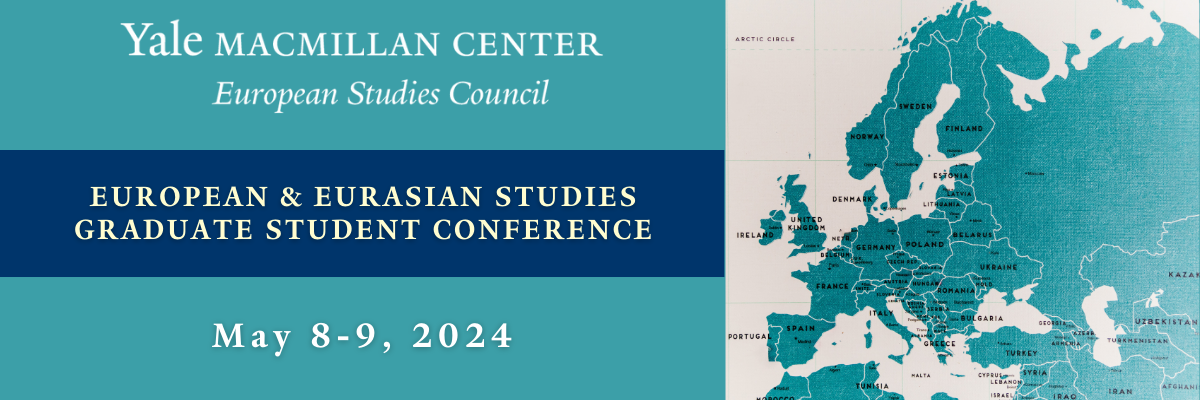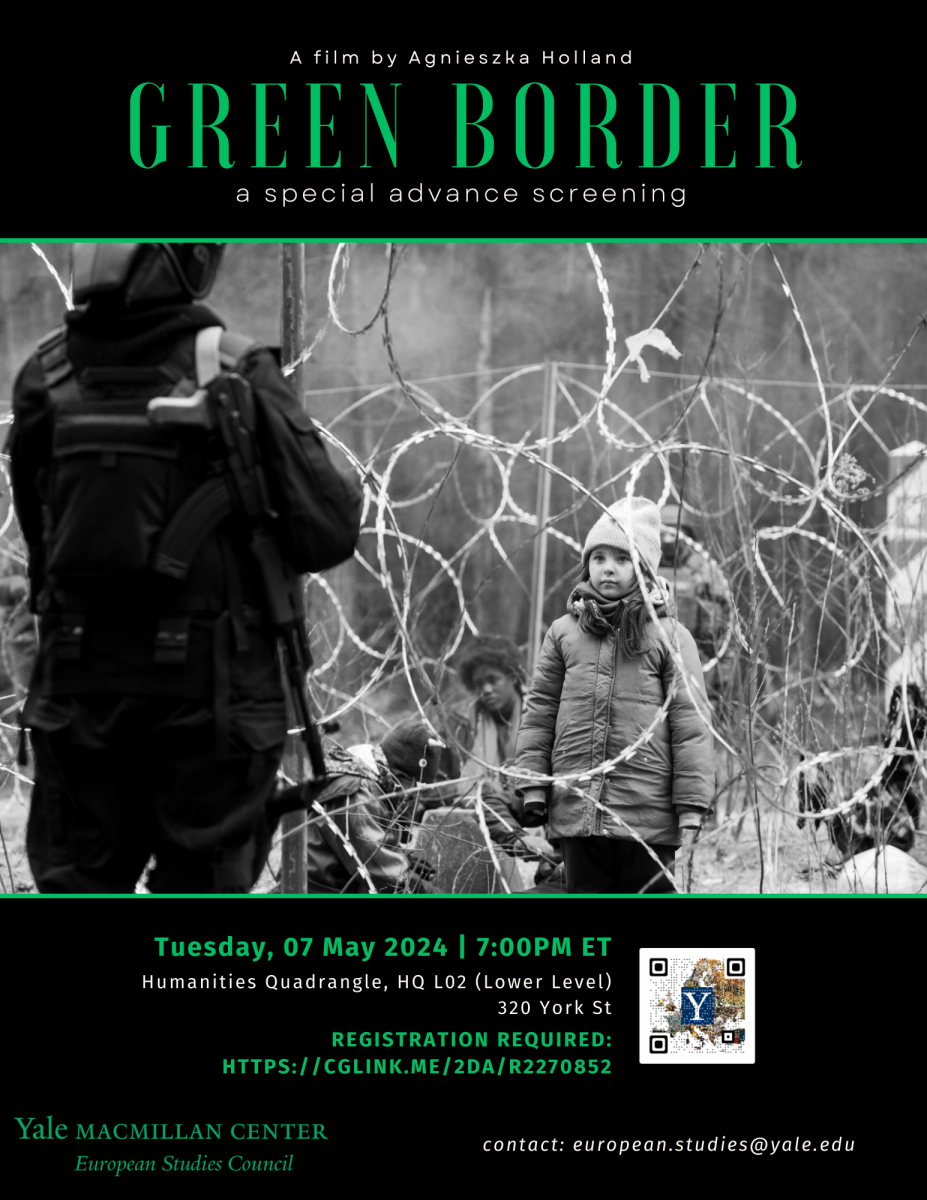
Yale European and Eurasian Studies Graduate Student Conference
The European Studies Council (ESC) of the Yale MacMillan Center for International and Area Studies and the Yale European Studies Graduate Fellows Network hosts the 5th annual Yale European and Eurasian Studies Graduate Student Conference. The hybrid-format conference is scheduled to take place on May 8-9, 2024, at Yale University. It will provide a forum for researchers to share and discuss work related to European, Russian, and Eurasian Studies, and include a concluding reception in celebration of Europe Day.
This international and interdisciplinary conference seeks to showcase current research and foster exchange between students, postdocs, and faculty working across diverse disciplines on the most pressing challenges facing Europe, Russia, and Eurasia today.
 |
Special Advance Screening of Agnieszka Holland’s
GREEN BORDER
Register to Attend: https://cglink.me/2dA/r2270852
7:00 p.m., Humanities Quadrangle (HQ), Rm L02
320 York St.
The event is open to registration only
|
Isabela Mares
Arnold Wolfers Professor of Political Science, Yale University
- Janani Mohan, Ph.D. Candidate, University of Cambridge (UK), Divergent Security Doctrines of Former Nuclear Weapons States in the Post-Soviet Bloc
- Katherine Trauger, M.A. Student in International Relations, Johns Hopkins University, ‘Island of Stability’: Foreign Aid, Gender Development, and State Security in Uzbekistan
- Aleksandra Tsarvulanova, M.S. Student in Strategic Studies, University of Aberdeen (Scotland), Broken Freezer: Why Conflicts in Post-Soviet Space Become Actual Again after Russia’s Invasion of Ukraine
- Discussant: Olena Lennon, Practitioner In Residence of National Security, University of New Haven
- Emil Kamalov and Ivetta Sergeeva, Ph.D. Researchers, European University Institute (Italy) and Visiting Scholars, Columbia University, Can Migrant Organizations Evade the Long Arm of Autocrats? A Conjoint Experiment on Donation Preferences Among Russian Exiles
- Tsimafei Malakhouski, M.Sc. Student, Oxford University (UK), Digitalisation of Authoritarianism in Belarus: Blending Online Surveillance with Offline Repression
- Alejandro (Ale) Martin Rodriguez and Vladyslav Wallace, M.P.P. Students and Belfer Center Fellows, Harvard University, Kyrgyz Civic Resilience: Navigating Challenges During Japarov’s Leadership and Russia’s Invasion of Ukraine
- Discussant: Peter Rutland, Professor of Government and the Colin and Nancy Campbell Chair for Global Issues and Democratic Thought, Wesleyan University
- Maggie Lindrooth, European & Russian Studies M.A. Student, Yale University, The Cost of Progress: Soviet Modernization as Colonial Violence in The Chukchi Bible
- Jacob Link, European & Russian Studies M.A. Student, Yale University, In the Loop: Bolshevik Internal Debates & the End of the First Georgian Republic
- Furqat Polvon-Zade, Ph.D. Student, Yale University, (Colonial) Infrastructures and settlements of Chirchik
- John Webley, Ph.D. Candidate, Yale University, Unnatural Borders: Russian Zoologists at the Edges of India
- Discussant: Claire Roosien, Assistant Professor in Slavic Languages and Literatures, Yale University
- Wiktor Babinski, Ph.D. Student, Yale University, The Odyssey of Francis Majewski: Exile, identity and national reconciliation through the eyes of a 20th century Pole
- Olga Petrova, Ph.D. Candidate, Central European University (Austria), The Meanings of the Ukrainian Revolution, 1917-1920: Whose Revolution? Whose Autonomy?
- Vita Raskeviciute, European & Russian Studies M.A. Student, Yale University, Mnemonic Civil War between the Last Citizens of the Grand Duchy of Lithuania
- Vesta Svendsen, M.A. Student, Yeshiva University, The Fortress: Urbicide and Mythology in Brest, Belarus
- Discussant: Viktoras Bachmetjevas, Joseph P. Kazickas Associate Research Scholar, Yale University and Associate Professor, Vytautas Magnus University (Lithuania)
5:00 pm Keynote Lecture by Alberto Alemanno, Jean Monnet Professor of European Union Law, HEC Paris (France)
Moderated by Ligia Fabris Campos, Henry Hart Rice Visiting Professor, Yale University and Assistant Professor at the Law School of Getulio Vargas Foundation (Brazil)
”How to Make Europe a People’s Project?”
After 70 years of unprecedented socioeconomic integration, the EU continues to evolve through processes that largely marginalize citizens’ input. It remains virtually impossible for an EU citizen – not to mention its residents – to express their desire for a change in the Union’s direction and hold its institutions accountable. Yet the question of how would the Union look like if it had put citizens at its centre not margins remains not only unanswered but also unimagined.
As over 400 millions voters are called upon to vote in the next EU parliament elections in June, this public lecture offers a critical yet constructive analysis of the structural conditions preventing the EU from democratizing, ranging from the absence of both a pan-EU electoral party system to the lack of a pan-EU public sphere. It finally suggests some power-shifting reforms enabling citizens, residents of the EU as well citizens from candidate countries to reclaim their voice and power in the Union.
- Oliver Banatvala, Ph.D. Candidate, University College London (UK), Wartime malleability: the shopping mall as public zphere since Russia’s full-scale invasion of Ukraine
- Przemysław Dałek, Ph.D. Researcher, University of Warsaw (Poland), and Visiting Scholar, George Washington University, Between Hegemony and Anxiety: Understanding the Complexities of Russian Foreign Policy toward Neighboring Countries
- Anna Linetskaya, Ph.D. Student in Comparative Literature and Literary Theory, University of Pennsylvania, Dreaming of David Burliuk: Regional Culture Production and Memory Practice in Putin’s Russia
- Discussant: David Cameron, Professor Emeritus of Political Science, Yale University
- Florian Dirmayer, M.P.P. Student, Harvard University, Can the Externalization of Migration Policy Work? Assessing Legal and Political Realities for a New EU-Türkiye Statement
- Murad Gafarov, Ph.D. Candidate, University of Florida, European Union Enlargement and the Issue of Belonging
- Alina Nychyk, Postdoctoral Researcher, ETH Zurich (Switzerland), War and Enlargement: Why Ukraine Became an EU Candidate Country
- Discussant: David Cameron, Professor Emeritus of Political Science, Yale University
- Pieter De Corte, Postdoctoral Fellow, Yale University, Nietzsche’s Russian Enigma: Barbarism, Empire and the Promise of the Third Rome
- Wenbin Gao, Ph.D. Student in Italian Studies and Renaissance Studies, Yale University, The Good Old Days? Evidence on Literary Studies from the SNS Archives
- Hannah Morand, Ph.D. Student in History, Yale University, Louis XIV in the Eighteenth-Century Court of Public Opinion
- Dan Nguyen, Ph.D. Candidate in Vietnamese History, Columbia University, Confucianized Cartesianism in Colonial Vietnam
- Discussant: Wentao Zhai, J.D. Student, Harvard University
- Xianda Huang, M.A. Student in East Asian Studies, Yale University, Shall we Listen to the Big Brother?: Exploring the Chinese Encounter with Soviet Music in the 1950s and 1960s
- Marjana Krajač, Ph.D. Candidate in Dance Studies, Ohio State University, Unfolding Spaces: Avant-Garde Horizons, Experimental Choreography, and Politics of Space in Milana Broš and Dubravko Detoni’s ‘La voix du silence’ at the 1973 Music Biennale Zagreb
- Asher Maria, Ph.D. Student, University of Pennsylvania, “NOVA LITUANIA and the Possibility of Ironic Colonialism”
- Ania Tropnikova, Ph.D. Candidate, Yale University, Transience in Screen Space: Body as Corridor in Valeska Grisebach’s WESTERN
- Discussant: Aniko Szucs, Assistant Professor, Queens College, CUNY
Please feel free to contact european.studies@yale.edu with any questions

